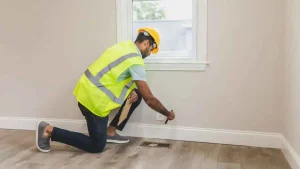Overview
Top 20 mistakes first-time homebuyers should avoid, but these 7 mistakes are a must avoid.
- Overlooked Costs: Plan for all expenses beyond the purchase price, including closing costs, property taxes, moving in, and maintenance.
- Mortgage Details: Understand your mortgage terms, interest rates, and any associated fees.
- Home Inspection: Always conduct a home inspection to identify potential issues before purchasing.
- Future Resale Value: Consider the home’s long-term value and how it fits into future market trends.
- Neighborhood Research: Thoroughly research the neighborhood’s safety, amenities, and future development plans.
- Pre-Approval: Get pre-approved for a mortgage to establish your budget and strengthen your offer.
- Avoid Emotional Decisions: Stick to logical criteria and budget constraints, rather than letting emotions drive your purchase.
Let’s dive into more details as you read…
Buying your first home is one of the most significant milestones in your life. It represents a major financial commitment and a step toward stability and independence. However, the process can be overwhelming, and many first-time homebuyers make mistakes that can impact their financial health and overall satisfaction with their purchase. In this comprehensive guide, we’ll explore the top 20 mistakes first-time homebuyers should avoid ensuring a smooth and successful home-buying experience.

1. Overlooking Total Costs
Understanding the Full Financial Picture
When buying a home, it’s easy to focus solely on the purchase price and forget about the additional costs involved. These costs can add up quickly and strain your budget if not properly planned for.
- Closing Costs: These are fees associated with finalizing the purchase of your home, including loan origination fees, title insurance, appraisal fees, and attorney fees. Closing costs typically range from 2% to 5% of the loan amount.
- Property Taxes: Annual property taxes can vary widely depending on the location of the home. Be sure to factor these into your budget.
- Homeowner’s Association (HOA) Fees: If your new home is in a community with an HOA, you’ll need to budget for monthly or annual fees that cover community maintenance and amenities.
- Maintenance and Repairs: Ongoing maintenance and unexpected repairs are inevitable. Set aside a maintenance fund to cover these costs.
Planning for Total Costs
To avoid overlooking these expenses, create a detailed budget that includes not only the purchase price but also these additional costs. Consulting with a financial advisor can help ensure that you’re fully prepared for the financial commitment of homeownership.
2. Ignoring Mortgage Details
Understanding Your Mortgage Agreement
A mortgage is a long-term financial commitment, and it’s crucial to understand the details of your mortgage agreement to avoid unpleasant surprises.
- Interest Rates: Fixed-rate mortgages have a consistent interest rate, while adjustable-rate mortgages (ARMs) can change over time. Understand which type suits your financial situation best.
- Loan Terms: Mortgage terms typically range from 15 to 30 years. Shorter terms usually have higher monthly payments but lower interest rates.
- Fees and Penalties: Be aware of any additional fees, such as prepayment penalties for paying off your loan early, or late payment fees.
Avoiding Mortgage Pitfalls
Read your mortgage agreement thoroughly and ask questions if anything is unclear. Consider working with a mortgage broker who can help you understand the terms and find the best deal for your situation.
3. Skipping a Home Inspection
The Importance of a Home Inspection
A home inspection is a critical step in the home-buying process that many first-time buyers may overlook. Skipping this step can lead to significant issues down the road.
- Identifying Issues: A professional home inspector will assess the condition of the home’s major systems, including plumbing, electrical, HVAC, and the roof. They can identify potential problems that may not be visible to the untrained eye.
- Negotiating Repairs: If the inspection reveals issues, you may be able to negotiate repairs or a lower purchase price with the seller.
Ensuring a Thorough Inspection
Hire a qualified home inspector with good reviews and credentials. Attend the inspection yourself to ask questions and get a firsthand look at the home’s condition.
Read Also: Top 20 Mistakes First-Time Homebuyers Should Avoid in 2024
4. Neglecting Future Resale Value
Considering the Home’s Long-Term Value
While buying a home is a personal decision, it’s also a financial investment. Neglecting future resale value can impact your ability to sell the property later on.
- Market Trends: Research the current real estate market trends in your area. A home in a growing neighborhood with increasing property values is likely to appreciate over time.
- Property Features: Look for features that are attractive to future homebuyers, such as updated kitchens and bathrooms, energy-efficient appliances, and good curb appeal.
Planning for Resale
Even if you plan to live in your home for many years, consider factors that will influence resale value. Consulting with a real estate agent can provide insights into what buyers in your area are looking for.
5. Not Researching the Neighborhood
Evaluating the Neighborhood
The neighborhood you choose is as important as the home itself. Failing to research the neighborhood can lead to dissatisfaction with your new home.
- Safety and Crime Rates: Check local crime statistics and talk to current residents to gauge the safety of the neighborhood.
- Amenities and Services: Consider proximity to schools, shopping centers, public transportation, and healthcare facilities.
- Future Development: Research any planned developments or zoning changes that could impact the neighborhood’s character and property values.
Thorough Neighborhood Research
Spend time exploring the neighborhood at different times of day and week. Engage with local community groups and use online resources to gather information about the area.
6. Failing to Get Pre-Approved

The Benefits of Pre-Approval
Getting pre-approved for a mortgage before you start house hunting is a crucial step that many buyers skip.
- Understanding Your Budget: Pre-approval gives you a clear understanding of how much you can borrow, helping you set a realistic budget.
- Strengthening Your Offer: A pre-approval letter from a lender demonstrates to sellers that you are a serious buyer, which can make your offer more competitive.
Obtaining Pre-Approval
Contact multiple lenders to get pre-approved and compare their offers. Make sure to provide accurate financial information to ensure an accurate pre-approval amount.
7. Making an Emotional Purchase
Avoiding Emotional Decisions
Buying a home is an emotional experience, but making decisions based on emotions rather than logic can lead to regret.
- Stick to Your Criteria: Establish clear criteria for your home search, such as budget, location, and features, and stick to them.
- Avoid Overpaying: Don’t be swayed by the charm of a home if it exceeds your budget or lacks essential features.
Making Rational Decisions
Use a checklist to evaluate homebuyers objectively. Consult with a real estate agent or trusted advisor to keep your emotions in check during the buying process.
8. Not Understanding Homeownership Costs
Budgeting for Homeownership
Homeownership involves more costs than just the mortgage payment. Understanding these costs is essential to avoid financial strain.
- Utilities and Maintenance: Budget for regular utility bills, such as electricity, water, and gas, as well as routine maintenance tasks.
- Property Taxes and Insurance: Include property taxes and homeowner’s insurance in your monthly budget.
Comprehensive Budget Planning
Create a detailed budget that includes all potential homeownership costs. Regularly review and adjust your budget as needed to accommodate any changes.
9. Disregarding Future Maintenance
Planning for Ongoing Maintenance
Maintaining a home requires ongoing effort and expense. Disregarding future maintenance needs can lead to costly repairs.
- Routine Maintenance: Regular tasks such as cleaning gutters, changing air filters, and servicing HVAC systems help keep your home in good condition.
- Emergency Repairs: Set aside a fund for unexpected repairs, such as plumbing issues or roof leaks.
Creating a Maintenance Plan
Develop a maintenance schedule and budget for routine and emergency repairs. Regularly review and update your plan as needed.
Read Also: The Ultimate Checklist for Your First Home Purchase in 2025
10. Rushing the Buying Process
Taking Your Time
The home-buying process can be overwhelming, but rushing through it can lead to mistakes and regrets.
- Conduct Thorough Research: Take the time to research properties, neighborhoods, and mortgage options thoroughly.
- Avoid Pressure: Don’t let sellers, agents, or your own timeline pressure you into making hasty decisions.
Navigating the Process Carefully
Set a realistic timeline for your home search and purchasing process. Allow yourself time to make informed decisions and avoid rushing into a purchase.
11. Ignoring the Home’s Location
Evaluating the Location
The location of your home affects not only your daily life but also its long-term value. Ignoring location factors can impact your satisfaction with the home.
- Proximity to Work and Schools: Consider how close the home is to your workplace, children’s schools, and other daily destinations.
- Neighborhood Dynamics: Assess the overall feel of the neighborhood and its impact on your lifestyle and well-being.
Researching the Location
Explore the area surrounding the home to understand its advantages and disadvantages. Consider factors such as commute times, noise levels, and local amenities.
12. Forgetting to Check the Market Trends
Understanding Market Trends
Real estate market trends can influence your home-buying decision and investment potential. Forgetting to check these trends can lead to poor timing and financial loss.
- Current Market Conditions: Research whether the market is a buyer’s or seller’s market, as this affects pricing and negotiation.
- Historical Trends: Look at historical data to understand how property values have changed over time in the area you’re considering.
Analyzing Market Trends
Consult with a real estate agent to gain insights into current market trends and forecasts. Use online tools and resources to research historical data and future predictions.
Read Also: Tenant Screening: 15 Essential Tips for Effective Screening
13. Neglecting to Budget for Moving Costs
Planning for Moving Expenses
Moving costs are often overlooked but can be a significant expense. Failing to budget for these costs can strain your finances.
- Moving Services: Costs for hiring movers or renting a moving truck can vary widely. Obtain quotes and compare services.
- Packing Supplies: Budget for packing materials such as boxes, bubble wrap, and tape.
Budgeting for the Move
Create a detailed moving budget that includes all related expenses. Plan and save for these costs in advance to avoid financial surprises.
14. Ignoring the Home’s Condition
Assessing the Home’s Condition
The condition of the home is crucial to its value and your future satisfaction. Ignoring this aspect can lead to costly repairs and maintenance.
- Structural Issues: Look for signs of structural problems such as foundation cracks or uneven floors.
- Interior Condition: Evaluate the condition of walls, floors, and appliances to identify any needed repairs or updates.
Evaluating Home Condition
Conduct a thorough inspection of the home’s interior and exterior. Consider hiring a professional to assess the condition and identify potential issues.
Read Also: 20 Essential Tips for Successful Landlords and Property Management in 2025
15. Failing to Communicate with Your Lender
Effective Communication with Lenders
Open and clear communication with your lender is essential for a smooth home-buying process. Failing to do so can lead to misunderstandings and delays.
- Provide Accurate Information: Ensure all financial information you provide is accurate and up to date.
- Ask Questions: Don’t hesitate to ask your lender about any terms or conditions you don’t understand.
Maintaining Communication
Regularly update your lender on any changes to your financial situation and stay informed about the status of your loan application.
16. Overextending Your Budget
Sticking to Your Budget
Overextending your budget can lead to financial stress and difficulties in managing homeownership costs. It’s important to remain within your budget to maintain financial stability.
- Avoid Stretching Finances: Don’t increase your budget based on emotions or the desire for a more expensive home.
- Plan for Additional Costs: Ensure your budget accounts for all potential homeownership costs, including maintenance and repairs.
Staying Within Budget
Use a detailed budget to guide your home search and purchase decisions. Consult with a financial advisor to ensure you’re making a financially sound choice.
17. Not Considering Future Needs
Planning for Future Changes
Your needs may change over time, and it’s important to consider these changes when buying a home.
- Family Growth: Consider the possibility of starting or expanding your family and how the home will accommodate these changes.
- Work from Home: If you anticipate working from home, ensure the home has space for a home office.
Anticipating Future Needs
Think about how your lifestyle and needs might evolve in the coming years. Choose a home that can adapt to these changes.
18. Skipping Homeowner’s Insurance
Importance of Homeowner’s Insurance
Homeowner’s insurance protects you from financial loss due to damage, theft, or liability. Skipping this coverage can lead to significant expenses in case of unforeseen events.
- Coverage Types: Ensure your policy covers damage to the home, personal property, and liability.
- Policy Comparison: Compare different insurance policies to find the best coverage and rates.
Obtaining Insurance
Research and obtain homeowner’s insurance before finalizing your home purchase. Regularly review and update your policy as needed.
19. Not Researching Local Schools and Amenities
Evaluating Local Schools and Amenities
The quality of local schools and amenities can impact your quality of life and the home’s value.
- School Ratings: Research the ratings and reviews of local schools, especially if you have or plan to have children.
- Nearby Amenities: Consider the proximity of amenities such as parks, shopping centers, and public transportation.
Researching Schools and Amenities
Use online resources and visit local schools and amenities to evaluate their quality. Engage with community members to gather insights.
20. Neglecting to Read the Fine Print
Understanding Contracts and Agreements
Reading and understanding the fine print of contracts and agreements is crucial to avoid unexpected issues.
- Contract Terms: Carefully review all terms and conditions in the purchase agreement, including contingencies and penalties.
- Ask for Clarifications: If anything is unclear, seek clarification from your real estate agent or a legal advisor.
Reviewing Documentation
Thoroughly read all documents before signing. Consult with a real estate attorney if needed to ensure you fully understand your obligations and rights.
Conclusion
Dealing with the home-buying process can be challenging, especially for first-time buyers. By avoiding these 20 common mistakes, you can make a more informed and confident decision, ensuring a successful and satisfying home purchase. Remember to thoroughly research, plan, and consult with professionals to guide you through each step of the process. For additional insights on where you might find the best deals, check out our guide on affordable places to buy a home in 2024. Happy home buying, cheers Guyz!







